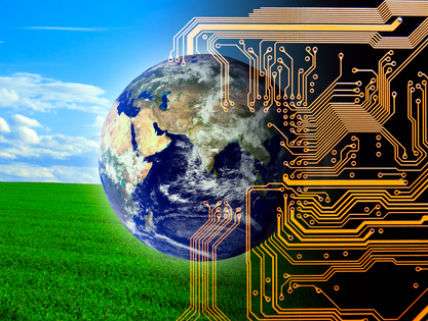3 Technologies Will Utterly Transform Your World in the Next Decade
Blockchain, CRISPR, and Machine Learning

Technological innovation has permanently slowed down and so too will economic growth asserts Northwestern University economist Robert Gordon. Why? Because all of the low-hanging scientific and technological fruit has supposedly been plucked. You can invent broad technologies like electrification, the light bulb, plumbing and sanitation, the telephone, refrigeration, the internal combustion engine, and the digital computer only once. Therefore most new technologies will consist of slight improvements on the old ones and that will not propel future economic growth.
But have all broad technologies really been invented already? Below are three core technologies whose elaborations during the next decade will conjure into existence a world with far less transactional friction, amazing cures, and much smarter machines.
The digital currency Bitcoin is the first way most folks heard of blockchain technology. By one simple definition, a blockchain is a kind of independent, transparent, and permanent database coexisting in multiple locations and shared by a community. (For nice simple explanation of how blockchains work, go here.) The beauty of a public distributed a blockchain is that records are permanent and cannot easily be falsified. It basically solves the problem of trust since everyone can see what was agreed to and what transactions actually have taken place.
Much of human society is structured with the aim of establishing trust through third parties, e.g., keeping track of who owns what; what was agreed to; and was the transaction completed. Think of intermediary institutions ranging from banks, stock markets, and property registries to the coercive functions of the state to mandate currencies, and enforce contracts. Third parties are trusted to keep track of information and generally take a cut of the action for their trouble.
Blockchain technology will cut out the middlemen and increase trust in records. Transactions can be securely paid for using blockchain currencies such as Bitcoin (which is rising toward $1,000 in value). My Reason colleague Jim Epstein brilliantly just reported how folks in Venezuela are using Bitcoin to survive amidst the rubble of socialism in that country. Some visionaries want to put the nation-state on the blockchain, including such functions as "an ID system based on reputation, dispute resolution, voting, national income distribution, and registration of all manner of legal documents such as land deeds, wills, childcare contracts, marriage contracts, and corporate incorporations." The new startup Publicism is developing blockchain anti-censorship tools as a way to promote free speech around the world.
Of course, like all technologies, there are kinks to be worked out. Hackers have famously stolen millions in Bitcoins, investments in the DAO, and the passwords for user accounts Ethereum Project's community forum. Such incidents identify the problems and speed up the process of improving security and standardization.
Biology is kludgy and complicated and therefore biomedical and biotech progress is maddeningly slow compared to digital technologies. However, precise genome editing made possible by CRISPR greatly simplifies experimentation and will speed up the development of medical therapies, biotech enhanced crops, and even enable humanity to curate wild landscapes. CRISPR genome editing is derived from what is essentially a bacterial immune system in which how bacteria protect themselves against attacking viruses. Cheap and easy to use CRISPR can edit genes much like a word processing program can edit text. And progress has been rapid.
For example, Chinese researchers are using CRISPR in an attempt to boost immune responses in lung cancer patients. American researchers are soon to follow. CRISPR could be used to ameliorate a whole variety of genetic diseases. The gene-editing technique has successfully reversed aging in human cells. Crop scientists have used CRISPR to develop mushrooms that resist browning; cucumbers that fight off disease viruses; and wheat that is protected against powdery mildew. Since no new genes are added or subtracted, anti-biotech activists will have a hard time arguing for the application of deadening hand of regulation to the new crop varieties. CRISPR editing will also enable breeders to produce disease resistant livestock and enable sex selection so that only male calves (more meat) and female chickens (more eggs) are born.
Want to eliminate disease-carrying mosquitoes or introduced species from the landscape? CRISPR editing can create gene-drives that make sure that both copies of a targeted natural gene in sexually reproducing species are replaced with the engineered version. For example, a suppression gene-drive could bias the production of sperm containing Y chromosomes, so that only males are born. The spread of the Y-drive would result in a population crash of the targeted species. That would be a great way to get rid of the non-native mosquito species that carries the Zika virus.
Various machine-learning algorithms are being deployed as increasingly effective techniques for dealing with the growing flood and complexity of data. Machine learning is a type of artificial intelligence that gives computers the ability to learn without being explicitly programmed. Such learning algorithms are generally trained to organize and extract information from being exposed to relevant data sets. It is often hard to discern exactly how the algorithm is devising the rules from which it makes predictions.
In March 2016, Google's AlphaGo artificial intelligence program defeated South Korean world Go champion Lee Sedol. Most interestingly, AlphaGo deployed strategies and moves never before used by human beings, thus improving future human play. More practically speaking, IBM is using machine learning to develop its Watson medical diagnostic programs to diagnose cancer and heart disease. The development of self-driving cars is also being advanced through machine learning. And thanks to deep learning, the universal translator is not too far in the future. Amazon, Google, and Microsoft are democratizing machine learning by offering it as a service through their cloud data platforms.
Microsoft's Bill Gates is right when he observed: "I think the idea that innovation is slowing down is one of the stupidest things anybody ever said."
Happy New Year.


Show Comments (105)